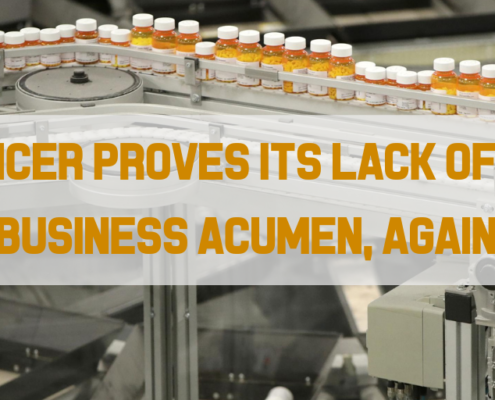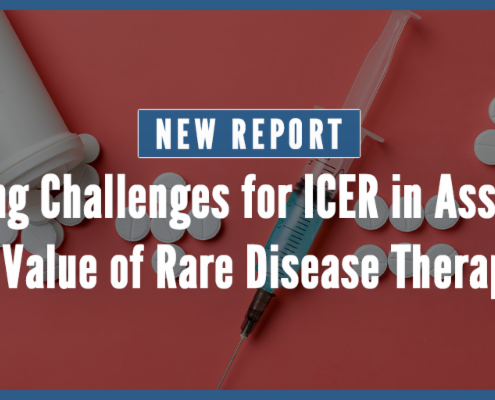A Rush to Judgment on Alzheimer’s Drug
This op-ed was originally published in Commonwealth Magazine.
The Boston-based Institute for Clinical and Economic Review (ICER) sells itself as an independent source of information on the value of pharmaceuticals. But earlier this month, their bias was again evident when they tried to kneecap a drug for a dreaded disease before there’s even enough data to determine how valuable the drug really is. ICER has adopted this same strategy in the past on innovative drugs for cancer, cystic fibrosis, and other devastating diseases. This time ICER’s target is aducanumab, Biogen’s drug for Alzheimer’s disease.
No one really knows how well aducanumab will work. ICER certainly does not know, the FDA does not know, and even Biogen does not know. The drug was submitted for FDA approval, withdrawn, and then submitted again based upon new data. Medical opinions on its potential effectiveness are all over the map. Some medical experts are excited, while others argue that the whole theory undergirding the drug, that Alzheimer’s is caused by a certain plaque on the brain called beta amyloid, is erroneous.
Therefore, ICER’s decision to issue a review of aducanumab based upon clinical trial data alone is very confusing, unless you understand its true mission. Regarding the effectiveness of aducanumab, ICER’s chief medical officer commented that, “the evidence remains insufficient to determine whether the drug provides an overall health benefit.” Yet, ICER went on to conclude that aducanumab’s price was “commensurate” with “cost-effectiveness thresholds between $2,500-$8,300 per year.”
Wait a minute. If there is “insufficient” data to understand how effective the drug is, how can ICER reach a specific recommendation on the appropriate price of the drug? Moreover, why even perform a complex economic analysis on a drug that may not even receive FDA approval?
If ICER was really interested in understanding the true value of aducanumab, it would do what Germany does: wait until after a drug is approved and is put into the bodies of hundreds of thousands, or even millions, of patients. At that point, you will then have very robust – not “insufficient” – data, and your price recommendation will be based on an accurate assessment of how well the drug actually works in the real world.
Of course, we know why ICER does not do as Germany does. Founded in 2006, it has received significant funding from the health insurance industry and its reports often give health plans leverage in their drug pricing negotiations with manufacturers. ICER wants to perform their reviews very close to the time of drug approval because, while waiting a year may provide more robust data, it’s too late to provide health plans with the leverage necessary to knuckle down prices in negotiations with manufacturers. Those negotiations happen right after FDA approval, so ICER’s review will be too late if it waits for “sufficient” data. Therefore, ICER’s model is to make guesses about the potential value of drugs based upon insufficient clinical trial data. This is because lowering drug prices for payers is their mission, not promulgating accurate assessments of value.
Given that an FDA advisory panel has already concluded once that aducanumab may not be effective and its FDA approval is on shaky grounds, we must also ask why ICER went to the trouble of reviewing the drug before the FDA even made its decision.
Again, the answer is obvious if you keep ICER’s mission in mind. A drug that is successful in treating Alzheimer’s will be a blockbuster, likely achieving billions in sales. For ICER, it is simply too risky to take a pass on providing arguments to payers on why they should pay less for that potentially costly, potentially life-changing drug. ICER’s mission is to kneecap new drugs right out of the box, and to create doubts about the effectiveness of new drugs without waiting for sufficient evidence. They can’t risk a billion-dollar blockbuster getting approved by FDA and leaving payers with no arguments about why the price is too high. So they do the reviews early, not knowing if the drug will even be approved, and with “insufficient” data. Not exactly an unbiased model.
It is no coincidence that, as Biogen pointed out in response to the review of aducanumab, ICER has assessed the value of drugs 102 times since 2016 and only 12 times found the medicines to be priced appropriately. Policy makers need to understand that ICER was set up by an interest group, the health insurance industry, with a very specific purpose in mind: provide arguments on why drug prices are too high. ICER’s arguments may be right or wrong in specific cases, but they are no more unbiased than those of the pharmaceutical companies.
William Smith, PhD, is visiting fellow in life Sciences at the Pioneer Institute. From 1999 to 2009, he was an executive at Pfizer Inc. Pioneer Institute receives no financial support from Biogen.
Clarification: This piece, which originally said ICER was created by the insurance industry, has been updated to say instead that it has received significant funding from the industry.









